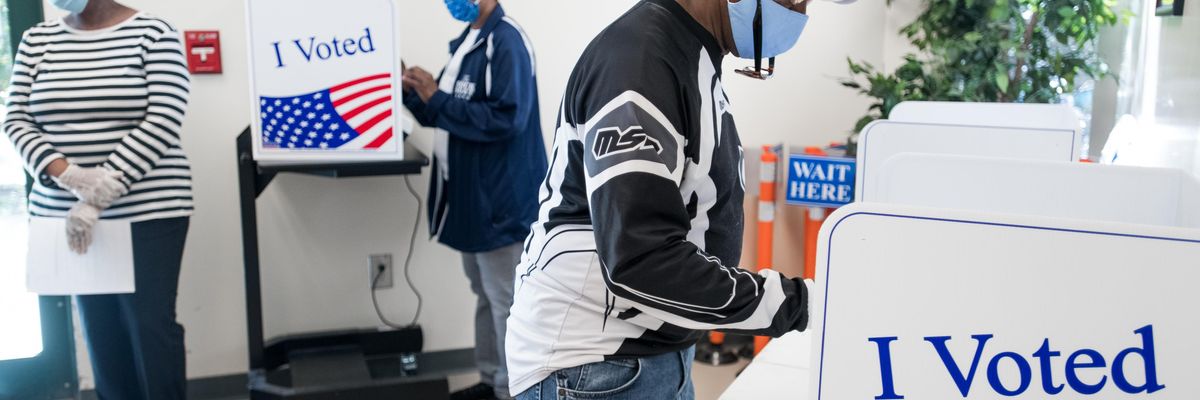Voting rights defenders on Thursday decried a federal panel's
decision to let South Carolina use a congressional map the three judges found to be racially gerrymandered in this year's primary and general elections due to the U.S. Supreme Court's delayed resolution of the case.
The three-judge panel of the U.S. District Court for South Carolina in Columbia ruled last August that "race was the predominant motivating factor" in the Republican-controlled state Legislature's design of the 1st Congressional District "and that traditional districting principles subordinated to race."
Their ruling, which ordered the redrawing of the map, noted that "Charleston County was racially gerrymandered and over 30,000 African Americans were removed from their home district."
"Make no mistake—these discriminatory maps are a direct attempt to suppress Black voices ahead of a consequential election."
In their new decision, the judges acknowledged the awkward predicament of ordering the use of an unconstitutional map.
"But with the primary election procedures rapidly approaching, the appeal before the Supreme Court still pending, and no remedial plan in place, the ideal must bend to the practical," they asserted.
Brenda Murphy, president of the South Carolina State Conference of the NAACP, said: "Make no mistake—these discriminatory maps are a direct attempt to suppress Black voices ahead of a consequential election. We will not stand idly by as the rights of thousands of South Carolinians continue to be overlooked."
"The court's ruling today, further delaying these proceedings, continues to tip the scale of justice during a crucial moment in our democracy in an undemocratic attempt to sway the outcome of the upcoming election," Murphy added. "We must strive for a system where every voice is heard and every vote counts, free from the stain of discrimination."
Last October, the U.S. Supreme Court heard oral arguments in the case, which was filed in 2021 by the South Carolina State Conference of the NAACP and voter Taiwan Scott. They are represented by the ACLU, NAACP Legal Defense and Educational Fund, the ACLU of South Carolina, Boroughs Bryant LLC, Arnold & Porter, and the General Counsel's Office of the NAACP.
As Democracy Docket noted Thursday: "The parties asked the Supreme Court for a decision by January 1, 2024. Nearly three months later, the court still hasn't ruled on the case, creating a dire situation for congressional candidates as the candidate filing period started on March 16 and will end on Monday."
Joshua Douglas, a professor at the University of Kentucky Rosenberg College of Law, said on social media that "someone should write an article about the number of times jurisdictions have been allowed to use an illegal map because there's 'not enough time' to create a fair, legal one."
Douglas noted states where this has occurred, including Alabama, Louisiana, Ohio, North Carolina, "and now South Carolina."
South Carolina primary voters will head to the polls on June 11.
The 1st Congressional District is represented by Congresswoman Nancy Mace, a Republican. On Thursday, she
toldThe Post and Courier that the judges' ruling "makes sense."
"It's only fair candidates know what the lines are," Mace said. "For us, I just want to know what constituents I'm serving."
Michael B. Moore, a Democrat running for the seat,
called the decision "regrettable."
"I'm disappointed it appears 30,000 people lost their political voice," he said, "and nobody seems to care."

